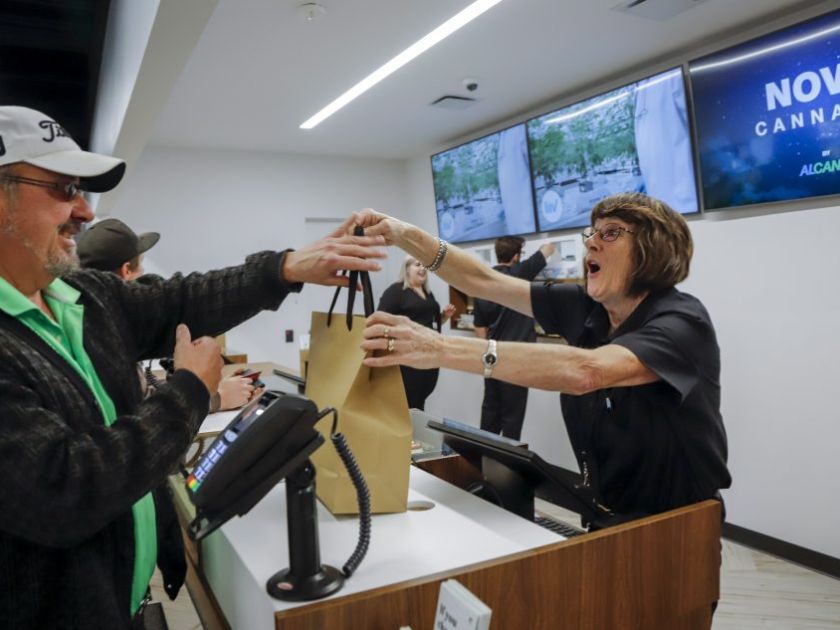You are here
Home 🌿 Recreational Marijuana News 🌿 Pot shop study gives homeowners something to puff on 🌿Pot shop study gives homeowners something to puff on

Denver is not Ontario, but researchers at Colorado State University found homes located close to legal cannabis dispensaries in that city actually rose in value – just the opposite of what many people might think.
Their research, recently published in the journal Contemporary Economic Policy, examined how home prices in Denver – the U.S. marijuana mecca, where recreational pot has been legal since 2014 – change when a cannabis retailer opens nearby.
While the London-area realtors’ association points out there’s no data to indicate how pot retailing might affect home prices in this region, the American researchers found that homes located within less than half a kilometre from a dispensary rose in value by 7.7 per cent on average.
Houses situated within 0.8 kilometres of a sanctioned pot shop rose by 4.7 per cent, while there was no effect for homes located farther than 0.8 kilometres away.
The study used data from homes that sold within one year of a dispensary opening nearby. The authors didn’t offer an explanation for why homes located near pot shops increased in value.
“The effect diminishes for homes further from new dispensaries but is consistent over time,” wrote the authors, Jesse Burkhardt, an assistant professor in the department of agriculture and resource economics, and graduate student Matthew Flyr.
“Our results provide important and timely empirical evidence on the socioeconomic impacts of marijuana legalization.”
Real-estate prices are generally driven by many factors, including economic conditions, the cost of borrowing and supply and demand.
What happened in Denver won’t necessarily occur here, however, the head of the London and St. Thomas Association of Realtors (LSTAR) says.
“Our region may react very differently than the Denver market did,” LSTAR president Jeff Nethercott said, adding it’s too early to predict how housing prices will be affected by the opening of dispensaries.
“We really don’t have data or stats to rely on,” he said.
The findings from the American study are at odds with a new survey from a real estate listings company that reported nearly half of respondents don’t want to live near a cannabis dispensary.
Forty-two per cent of those polled say that having a storefront cannabis retailer in their neighbourhood would harm nearby property values, while 48 per cent of respondents say the presence of a dispensary nearby would reduce their desire to purchase a specific property, according to the study commissioned by Zoocasa.
The findings come as municipalities across the country mull whether to opt out of allowing legal marijuana dispensaries in the city ahead of a Jan. 22 deadline imposed by the province.
London city councillors voted in December to allow dispensaries in the city when the bricks-and-mortar businesses are allowed to begin opening in April, saying opting out would cost the city thousands of dollars in government funding to manage the impact of cannabis retailers and discourage new businesses from coming to London.
For now, Ontario’s only legal pot retailer is the online Ontario Cannabis Store, a provincial government monopoly.
London has already received $450,000 from the province to deal with the introduction of legal cannabis, with a cut of another $15 million coming over the next two years.
Some municipalities in Southwestern Ontario, including Ingersoll, Blandford-Blenheim, East Zorra-Tavistock and Plympton-Wyoming, have voted to opt out of having dispensaries in their communities.
Critics say banning the stores will fuel the rise of black market pot shops. In London, a handful of the illegal businesses continue to operate despite repeated police raids.
Under rules set by the province, legal dispensaries must be located at least 150 metres from schools.
The Progressive Conservatives at first promised to grant an unlimited number of cannabis retail licences when the bricks-and-mortar stores are allowed to open in April, but now will only dole out 25 through a lottery system.
Seven of those licences have been allocated to the so-called west region, a vast area of the province stretching from Windsor to Niagara to Waterloo, meaning London could get left without a single legal dispensary in the spring.
420 Intel is Your Source for Marijuana News
420 Intel Canada is your leading news source for the Canadian cannabis industry. Get the latest updates on Canadian cannabis stocks and developments on how Canada continues to be a major player in the worldwide recreational and medical cannabis industry.
420 Intel Canada is the Canadian Industry news outlet that will keep you updated on how these Canadian developments in recreational and medical marijuana will impact the country and the world. Our commitment is to bring you the most important cannabis news stories from across Canada every day of the week.
Marijuana industry news is a constant endeavor with new developments each day. For marijuana news across the True North, 420 Intel Canada promises to bring you quality, Canadian, cannabis industry news.
You can get 420 Intel news delivered directly to your inbox by signing up for our daily marijuana news, ensuring you’re always kept up to date on the ever-changing cannabis industry. To stay even better informed about marijuana legalization news follow us on Twitter, Facebook and LinkedIn.




